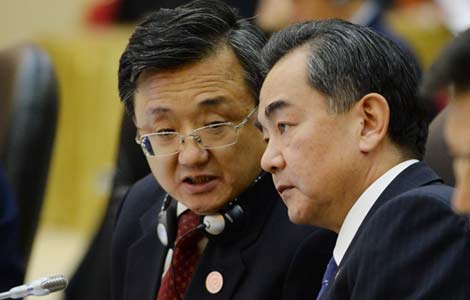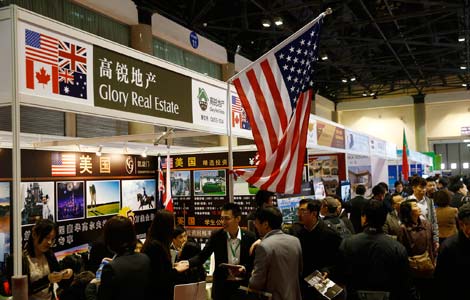Longer term for visas to attract talent
Updated: 2013-07-01 09:04
By Zhao Yinan (China Daily)
|
||||||||
Overseas candidates with management experience at leading multinationals and top specialists in education and science are eligible to apply for a talent visa in China, according to draft legislation.
A draft soliciting the opinions of government insiders and experts suggests the country has outlined the key points in evaluating whether a foreign professional is "urgently needed", an issue widely discussed since the Exit-Entry Administration Law was passed in June last year.
"Urgently needed" professionals, as stated in the law, will be able to apply for the new talent visa, which grants residency for up to five years, or multiple entries for up to 180 days at a time.
According to the draft given to China Daily by an insider who asked to remain anonymous, five major kinds of professionals may be categorized under the talent pool:
senior management professionals at globally renowned enterprises, financial institutions, accounting firms and architecture offices, with profound knowledge in the field and its international rules;
senior specialists at globally renowned enterprises, financial institutions and accounting firms and architecture offices, with independent intellectual property rights and the core technology;
senior science and education professionals at globally renowned universities and institutions, with ranks equal to professor who have made great contributions to the development of a particular field;
renowned cultural, arts and sports figures being globally received, or winners of major international awards in their field;
and other high-end international talent that China urgently needs.
However, the insider emphasized that the draft is still in its early stage and is subject to change after gauging feedback from government departments and experts.
The Exit-Entry Administration Law, which is to take effect on Monday, is seen as part of China's efforts to attract global talent by offering detailed and convenient stipulations on the entrance, stay and exit of foreign residents.
Wang Huiyao, director of the nonprofit Center for China and Globalization, said the talent visa provides convenience for top professionals from overseas interested in working in China.
"Talent exchanges globally are much more frequent than before, and a government providing favorable conditions for them to exit and enter can win over most intellectual support," the insider said.
He added that China's move complies with the global trend to ease visa requirements to attract overseas talent.
More than 30 countries have introduced policies for enhancing travel convenience and making visa processing easier for talent as of 2005, according to the United Nations. That includes 17 developed countries, such as the United States, and 13 emerging and developing countries.
Liu Guofu, an immigration law specialist at the Beijing Institute of Technology, said while the draft aims to attract global talent, it is still not specific enough.
He said a guidance catalogue for foreigners working in China is also being drafted, which will include specific industries that most need foreign experts and which will be updated from time to time.
Liu also said he does not think introducing a talent visa will be enough for China to keep global talent, since foreigners are still subject to excessive red tape and institutional barriers when they renew a visa, buy real estate, or apply for a domestic driving license.
"Many foreigners don't have the time and linguistic advantage to understand the complicated stipulations, which are scattered in different laws and regulations," he said.
The government should help foreigners understand related stipulations to avoid misunderstanding, he said.
Jenny Lee, a Singaporean who has retired to Shenzhen, Guangdong province, with her husband, whose ancestral home is in the area, said she felt she had been shortchanged by China's property policy.
She recently paid a large sum in cash to a real estate agent to purchase a secondhand apartment. Yet when the couple arrived at the property developer's office to finalize the contract days later, having already renovated and furnished the apartment, Lee said she was told by a staff member she is not qualified to own a home.
As citizens of Singapore, Lee and her husband are allowed to stay on the Chinese mainland for up to 15 days without a visa. To remain long-term, they simply visit Hong Kong and re-enter the mainland every two weeks.
However, according to a regulation on the entrance and management of foreign capital in the Chinese real estate market, foreigners are allowed to purchase a home only if they have worked or studied in China for at least a year.
"We were shocked and are very sad. We only wanted to have a comfortable home to stay in until we die," said Lee, who is in her early 60s. "Why didn't they tell us (about the restriction) before we bought the place?"
She said she cannot read Chinese, which has made it even more difficult to figure out the policy of the Chinese government.
Lee and her husband are waiting to get back the money they paid to the original owner.
Wang Shude, a property lawyer in Beijing, said foreigners in China face challenges with many important matters, such as purchasing a house or car, or seeing a doctor.
"These things may not be as politically important as the visa issue, but they are very important to foreigners who live in China," he said.
"The government should provide the same convenience as they do on the visa issue."
zhaoyinan@chinadaily.com.cn
(China Daily USA 07/01/2013 page1)

 Gay pride parade around the world
Gay pride parade around the world
 Four dead in Egypt clashes, scores wounded
Four dead in Egypt clashes, scores wounded
 New NSA spying allegations rile European allies
New NSA spying allegations rile European allies
 Foreign minister makes ASEAN debut as tensions flare
Foreign minister makes ASEAN debut as tensions flare
 Yao stresses transparency in charity
Yao stresses transparency in charity
 NYC's gay pride march for celebration
NYC's gay pride march for celebration
 Massive debt plagues local gov't
Massive debt plagues local gov't
 Looking abroad for better investment
Looking abroad for better investment
Most Viewed
Editor's Picks

|

|

|

|

|

|
Today's Top News
Mixed outlook for EV makers in China and US
Obama to announce new power initiative for Africa
China's June manufacturing PMI falls to 50.1
Putin signs anti-gay measures into law
Mandela remains critical as family feuds
New NSA spying allegations rile EU
Fugitive terror suspect nabbed
Minister makes ASEAN debut
US Weekly

|

|






